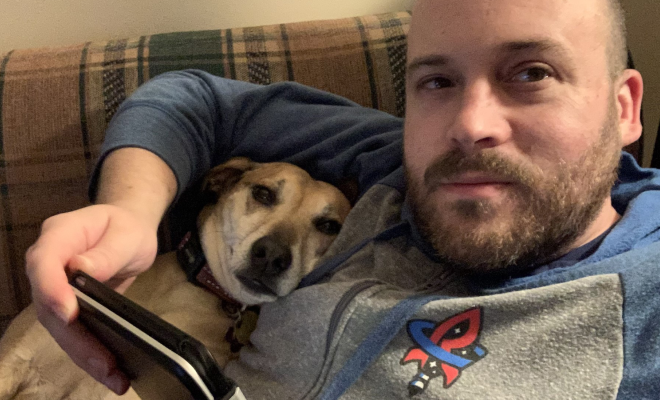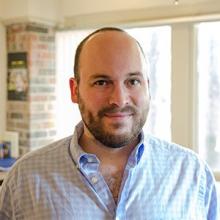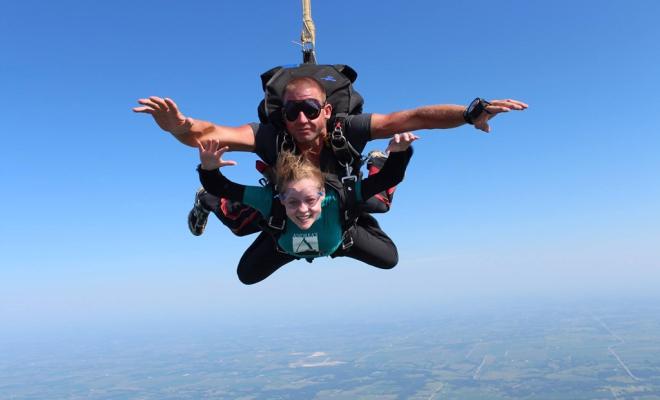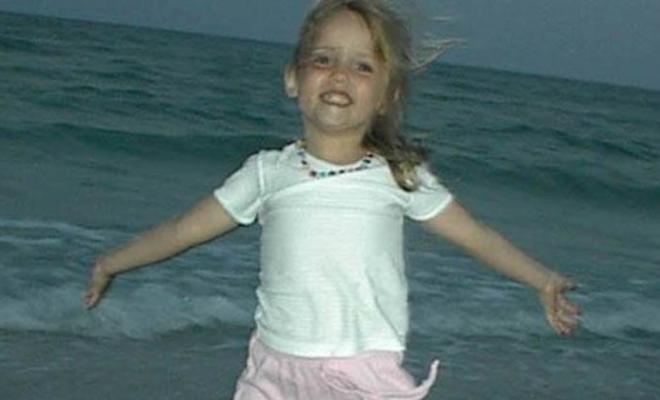At my job, I recently had the opportunity to be interviewed by one of my colleagues for a blog post examining how my life as a person with cystic fibrosis has intersected with and informed my career in science. As a result, I have been reflecting on the different ways that having CF has played a role in my career and identity.
First, for the specifics — I work as a computational biologist at a genetics research institution called HudsonAlpha Institute for Biotechnology. One of our major focus areas is using genome sequencing technology to diagnose rare diseases, and my role focuses on building and maintaining software pipelines to transform massive amounts of raw sequencing data into human-interpretable results. (We’ll come back to that!)
Like a lot of people, I went through several stages of wondering what I want to be when I grow up. The first thing I wanted to be was an astronaut, which — fortunately for the sake of feasibility — was soon replaced with a teacher. Then came programmer, followed by definitely not a programmer. By this point, in the middle of high school, I was starting to consider a science career — though I wasn’t quite sure what form that would take. I wouldn’t have expected bioinformatics (at the time an academic concept and not a job title) or CF advocate.
Then there’s CF itself. Since I was diagnosed at roughly 1 year old, the first thing I learned about CF was probably that most other people didn’t have enzymes, clinic appointments, and chest PT. Eventually I found out that CF came with a “typical lifespan” attached, which in the mid-1990s was “about 30.” Not that I could conceptualize being 30 at the time, but that’s not a number one can ignore for long. As a teenager in the early 2000s, I first connected to other people with CF through email lists like Cystic-L and Teens With CF. So, by the time I was really beginning to think about the idea of a career, I knew that CF was complex and hard to predict. There were few people with CF in their 60s and 70s, and more who didn’t make it to adulthood. I knew that I was a pretty fortunate CF patient. I had good lung function and hadn’t even been hospitalized by that time. One of my doctors said, “Plan for retirement.” So a career was definitely something I was able to think about, but I also knew CF would somehow influence what kind of work I did.
Having CF and the inherent uncertainty it involves was one reason I became interested in science. I was always a scientifically curious kid, but as I started learning more about CF as a teenager, it led me to enjoy learning about biology and chemistry. I liked learning about how different medications worked, how the CFTR protein should work in cells, and what kind of CF treatments were being developed. Learning how everything works remains one of the ways I cope with CF and participate in my own care. I’m the patient who wants to read all my test results, learn about the specific species of bacteria infecting my lungs, and understand why this particular antibiotic was picked to treat it.
When I started college, I decided to major in chemistry. I didn’t know quite where it was going to take me, but I knew it was an area I was excited to learn more about and could be used in a variety of science or technology related careers. Along the way, I picked up an unexpected enjoyment of math and programming. So by the time I graduated, I had earned majors in math and chemistry, a minor in biology, and a couple of graduate-level biochemistry classes. (I had also spent enough time in college choirs that some people assumed I was a music major.) But when people asked if I was going to study CF specifically, I said “probably not.”
In my first job after college, I worked for about four years for the Department of Defense after being recommended by one of my math major friends.
In this phase of my career, I mostly considered my life with CF to be separate from work. I didn’t want to keep it a secret, and it certainly came up at times when I had to be absent because of illnesses, doctors’ appointments, or home IVs. But at the same time, I didn’t lead with that information — in that environment, I felt like I’d rather be known for my skills and not my challenges.
Plus, I was very conscious to follow the general advice I’d gotten for many years not to disclose a disability like CF before getting hired. So, in that world, I looked at CF as more of a liability to work around than the type of asset I might highlight on my resumé.
After a few years, I decided that I wanted to move into a more hands-on science career and started working part-time on a master’s degree in modeling and simulation with the hope of applying those skills to biology research.
I was fortunate to find a professor in the biology department of my school who was interested in advising a computationally focused student, and I started learning more about how computational methods played a role in the field of modern genetics. As it turned out, this was around the time that was dealing with one of those complicated CF situations — a nontuberculosis mycobacteria (NTM) infection and treatment which started with a three-month course of IVs.
Managing a full-time job, classes, and a long home IV regimen was, of course, a challenge. Eventually, I brought this up with my advisor, and his response was actually, “I’ve got some CF research projects you might be interested in.” This led to my master’s thesis project where I was able to predict where regulatory proteins could bind around the CFTR gene and influence how the gene is turned on or off in different tissues.
While I was working on this project, I also had the opportunity to interview for a junior computational biologist position in a lab that focused on using genome sequencing to diagnose rare diseases, certain developmental and intellectual delays, seizures, and other pediatric-onset conditions.
As I considered the interview process for this job, I started to view my experience as a person with CF as a unique asset and part of the skills I could bring to the role. I knew from my experience and from others’ shared experiences in the CF community that having an early and conclusive diagnosis could be incredibly powerful for families.
For a rare disease patient on what we often refer to as a “diagnostic odyssey,” receiving a specific diagnosis can lead to getting better treatments or support, finding closure in having an answer, or connecting with other patients or families who are also affected by what might be an incredibly rare condition.
So, this time, I decided that if there was anywhere to talk about CF in a job interview, it would be here. This was happening just as more CFTR modulators started to become available, which I knew would never have been possible without that underlying research to link the disease to a specific gene. I knew that I would be passionate about helping to bring this kind of knowledge to families dealing with other diseases.
I got the job. As I started to get comfortable with this new field and finished up my master’s degree, I came across another serendipitous opportunity. At some point, I had signed up for the CF Foundation’s Community Voice to learn about opportunities to share my perspective as a member of the CF community, and one day a call for applications to the Adult Advisory Council (AAC) caught my eye. The AAC is a small group of adults with CF who provide insight and feedback to the Foundation on their experiences and community priorities. I was one of four adults with CF invited to join for the 2018-2020 term. Joining the AAC reconnected me to the broader CF community, and from there I became involved in several other initiatives, including CF Foundation strategic planning, the Clinical Review Committee, and becoming a patient partner with my clinic’s quality improvement team.
Many of these connections eventually led to professional opportunities as well. For example, while I was serving on the AAC, we heard about what was then a brand-new virtual event called ResearchCon, which planned to connect the CF community with CF researchers to learn about the latest CF research. I immediately knew that I wanted to be involved, since it was the perfect intersection of my interests and personal CF experience. I joined the planning committee for ResearchCon 2019, and while we were developing sessions and content, one of the team members had the idea to put together a roundtable discussion of adults with CF who worked as researchers. Through that roundtable, I got to know some incredible friends and colleagues, including Ella Balasa, Xan Nowakowski, Tré LaRosa, and Miram Figueira.
In the months after that first ResearchCon, we decided to write a paper describing the experience, its personal impact on us as patients and scientists, and the importance of patient science in the healthcare field. Xan, a medical school professor with Florida State University, also arranged for me to visit and give a seminar lecture to their medical students about my work with HudsonAlpha. Other connections between my professional and advocacy experience have included contributing to some CFTR genetics papers, presenting quality improvement work at the North American CF Conference, and learning more about academic grant-writing and reviewing.
After these experiences and others, I’ve found a more expansive view of how my different roles and identities can build upon one another. My “personal life” as a CF patient, my “volunteer life” as a CF community advocate, and my “professional life” in rare disease genomics have each given me insights and experiences to inform the others. And if I ever figure out exactly what I’m going to be when I grow up, I’ll be sure to let you know.
Interested in sharing your story? The CF Community Blog wants to hear from you.






